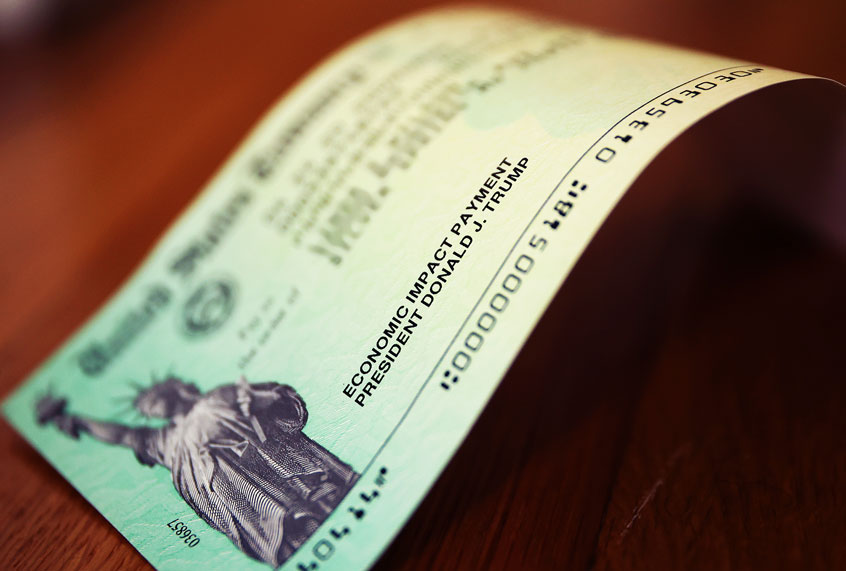With unemployment continuing to rise, President Donald Trump told a reporter at the White House that he plans on supporting another stimulus bill.
“We had this going better than anybody has ever seen before,” Trump said. “We had the best job numbers, the best economics, the best economy we’ve ever had. And then we had the virus come in from China, and now we’re rebuilding it again. We will be doing another stimulus package. It will be very good, it will be very generous.”
When asked when he thought he would come out with a specific plan, Trump said, “I think it’s going to be bipartisan, I think it’s going to be over the next couple of weeks, probably.”
What could that stimulus bill look like?
First, it will not come as a check that you’ll see in the near future, since Congress is not expected to consider the next economic spending bill until late July. Beyond that, if Republicans have their way (and they currently control both the White House and the Senate), it will probably be more modest than the earlier stimulus legislation. Both the Trump administration and Republican congressional leaders are pushing for a more limited bill.
This is not, however, what the House of Representatives — which is controlled by Democrats — wants. The HEROES (Health and Economic Recovery Omnibus Emergency Solutions) Act passed by that legislative chamber in May and would spend $3 trillion and provide the average household with $2,170 (as opposed to $1,729 under the previous bill). Like the first stimulus, which was officially known as the CARES (Coronavirus Aid, Relief and Economic Security, or CARES, Act), the HEROES Act would provide $1,200 checks to single taxpayers with a maximum adjusted gross income of up to $75,000 and married couples whose maximum adjusted gross income does not exceed $150,000. After that, the payments would gradually be reduced until they disappear entirely for single taxpayers making $98,000 or more and married taxpayers with an income of $199,000 or more.
Unlike the CARES Act, which only provided $500 payments for children and established a cutoff age of 17, the HEROES Act would provide $1,200 payments for each child in a family up to three children and would include 17-year-olds and 18-year-olds. The bill would also grant $1,200 payments to college students whose parents claim them as dependents, another contrast from the CARES Act. It would also depart from the CARES Act by providing payments to Americans who are married to immigrants without a Social Security number.
It is unlikely that the HEROES Act will be passed, though, at least in its current form. Republicans are pushing for a smaller bill and can block all legislation from being passed if they do not get their way. The one piece of leverage held by Democrats is that as much as $1 trillion could disappear from the economy in the third quarter if no stimulus is passed. With Trump lagging far behind former Vice President Joe Biden in most polls, the president cannot afford another major economic setback.
In an interview with White House Economic Adviser Larry Kudlow on Fox Business on Tuesday, Kudlow said, “There’s a lot of discussions going on. Probably, we would want to target those folks who lost their jobs and are most in need.”
Yet the last stimulus bill did not successfully target the neediest. There were five provisions in the first stimulus bill that were written to provide benefits to corporations, the rich, the upper middle class and people who have large stock investments (amounting to $257.95 billion, compared to $292.37 billion for the stimulus that went to the non-economically privileged).
Likewise, on Thursday, the U. S. Government Accountability Office, an independent investigative agency that reports to Congress, revealed that almost 1.1 million stimulus payments totaling nearly $1.4 billion were sent to dead people.
From both an economic and a public health standpoint, the Trump administration’s management of the pandemic pales in comparison to other nations that were able to stave off the worst effects of the pandemic through targeted social welfare and public health measures. In the United States, the pandemic has a death toll comparable with that of American lives lost during World War I, while the government’s inability to save jobs has led to a nascent depression. Nations that implemented adequate worker protections and early testing, saw only modest increases in unemployment: South Korea from 3.3 percent in February to 3.8 percent in April, Germany from 5 percent in February to 5.8 percent in April and Australia from 5.1 percent in February to 6.2 percent in April. The United States saw its unemployment rate skyrocket from 3.5 percent in February to 14.7 percent in April, meaning that roughly 17 to 18 million more Americans would have their jobs right now if Trump had followed the examples of South Korea, Germany and Australia.

